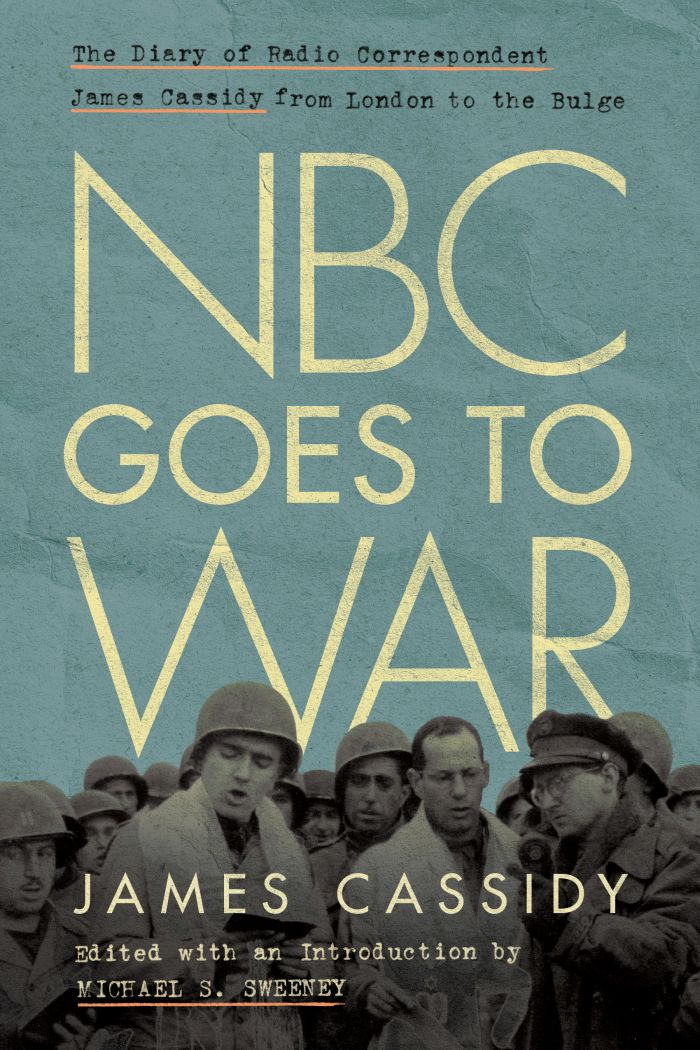NBC Goes to War
The Diary of Radio Correspondent James Cassidy from London to the Bulge

This book can be opened with

The diary of radio correspondent James Cassidy presents a unique view of World War II as this reporter followed the Allied armies into Nazi Germany.
James Joseph Cassidy was one of 362 American journalists accredited to cover the European Theater of Operations between June 7, 1944, and the war’s end. Radio was relatively new, and World War II was its first war. Among the difficulties facing historians examining radio reporters during that period is that many potential primary documents—their live broadcasts—were not recorded. In NBC Goes to War, Cassidy’s censored scripts alongside his personal diary capture a front-line view during some of the nastiest fighting in World War II as told by a seasoned NBC reporter.
James Cassidy was ambitious and young, and his coverage of World War II for the NBC radio network notched some notable firsts, including being the first to broadcast live from German soil and arranging the broadcast of a live Jewish religious service from inside Nazi Germany while incoming mortar and artillery shells fell 200 yards away. His diary describes how he gathered news, how it was censored, and how it was sent from the battle zone to the United States. As radio had no pictures, reporters quickly developed a descriptive visual style to augment dry facts. All of Cassidy’s stories, from the panic he felt while being targeted by German planes to his shock at the deaths of colleagues, he told with grace and a reporter’s lean and engaging prose.
Providing valuable eyewitness material not previously available to historians, NBC Goes to War tells a “bottom-up” narrative that provides insight into war as fought and chronicled by ordinary men and women. Cassidy skillfully placed listeners alongside him in the ruins of Aachen, on icy back roads crawling with spies, and in a Belgian bar where a little girl wailed “Les Américains partent!” when Allied troops retreated to safety, leaving the town open to German re-occupation. With a journalistic eye for detail, NBC Goes to War unforgettably portrays life in the press corps. This newly uncovered perspective also helps balance the CBS-heavy radio scholarship about the war, which has always focused heavily on Edward R. Murrow and his “Murrow’s Boys.”
In his war diary, radio correspondent James Cassidy combined a historian’s knack for analysis with a novelist’s eye for detail. It explains why events, from Normandy to the Bulge, seem to sear into your mind, sometimes uncomfortably so.—Dr. Peter Schrijvers, author of Those Who Hold Bastogne
A truly fascinating book. Michael Sweeney’s impressive investigative and editorial skills have rescued this NBC journalist from obscurity—and, in the process, he has produced a must-read for anyone interested in war reporting in general and World War II in particular.—Steve Casey, Professor of International History, LSE
Michael Sweeney did a masterful job of finding this document and presenting it to readers with appropriate context.—American Journalism
James Cassidy was a war correspondent for NBC News during World War II. He reported from London, Belgium, France, and the front line during the Battle of the Bulge. Among his accomplishments, he secretly transported a rabbi and more than 50 soldiers into the German combat zone and broadcast the first Jewish service on German soil. After the war, Cassidy followed a career in corporate public relations in New York City and Washington, D.C. In 1981, he and his wife, Rita, retired to Connecticut. He died in 2003.
Michael Sweeney (Edited By)
Michael S. Sweeney (1958–2022) was Emeritus Professor in the E. W. Scripps School of Journalism at Ohio University. His research focused on the history of combat correspondence, and on censorship in particular. His most recent book, which he co wrote with Natascha Toft Roelsgaard, is Journalism and the Russo-Japanese War: The End of the Golden Age of Combat Correspondence.
Foreword by Michael S. Sweeney | vii
List of Acronyms, Abbreviations, and Army Terms | ix
Introduction | 1
1. July 24 through August 3, 1944 | 13
2. August 4 through August 23, 1944 | 25
3. August 24 through September 14, 1944 | 47
4. September 16 through October 13, 1944 | 76
5. October 14 through November 30, 1944 | 105
6. December 1 through December 31, 1944 | 134
Text of James Cassidy
Broadcasts, December 21 through 29, 1944 | 165
Appendix: Significant American Correspondents Mentioned in Text | 183
Acknowledgments | 189
Notes | 191
Index | 201




